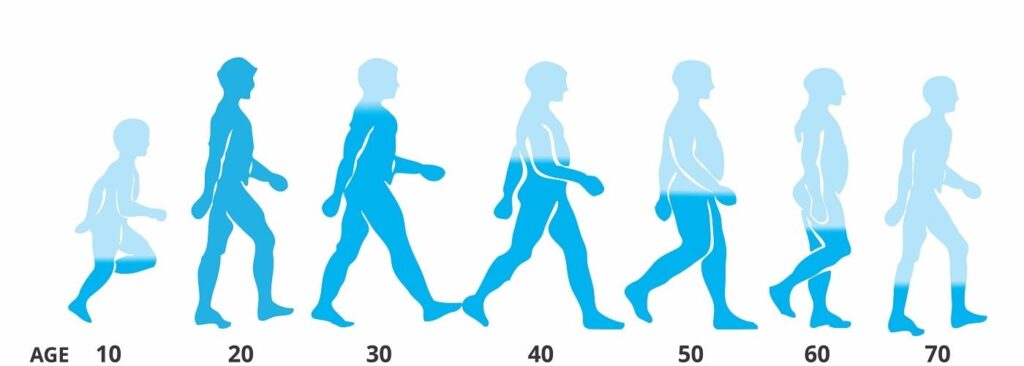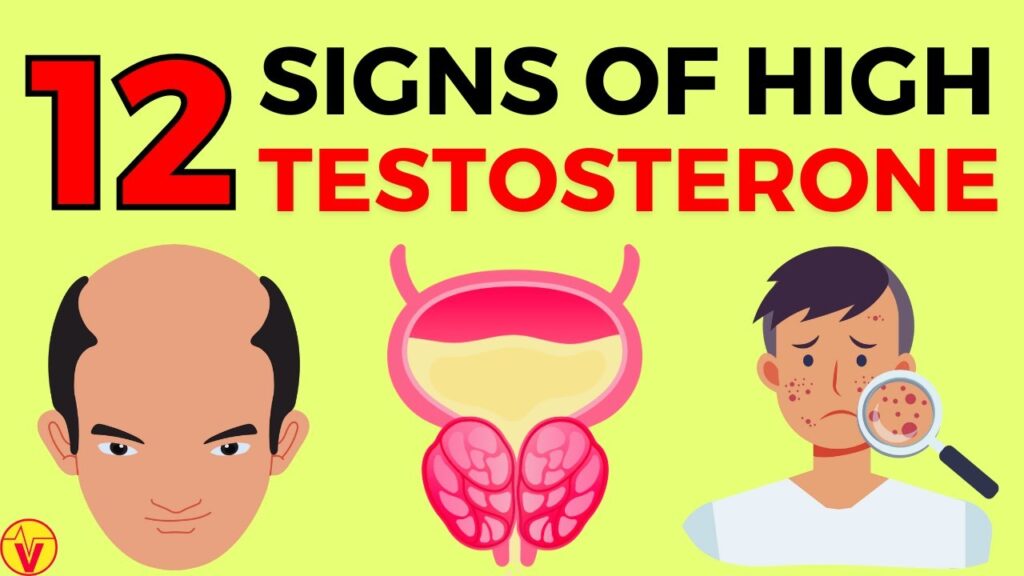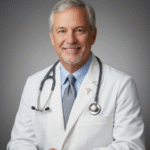
Testosterone is essential for muscle, bone, and sexual health, but excessive levels especially from supplements or therapy can suppress sperm production and cause infertility. High testosterone disrupts hormonal balance in the brain–testicle axis, reducing sperm count and impairing fertility.
Key Takeaways
- High testosterone, mainly from therapy or steroids, suppresses LH and FSH, halting sperm production.
- Most cases of testosterone-induced infertility are reversible but recovery may take months or remain incomplete.
- Typical symptoms: acne, aggression, testicular shrinkage, high libido, hypertension, and mood swings.
- Men planning for children should avoid external testosterone or use fertility-sparing treatments (hCG, clomiphene).
- Baseline semen and hormone testing are essential before TRT or supplement use.
- Early medical supervision prevents long-term fertility loss and hormonal damage.
Normal Testosterone & Spermatogenesis
Testosterone is part of a finely balanced system in the male body. This system is known as the hypothalamic-pituitary-gonadal (HPG) axis. Here is how it works:The hypothalamus in the brain sends signals using a hormone called GnRH. This tells the pituitary gland to release two other hormones, LH and FSH, which travel to the testicles. These hormones tell the testicles to produce testosterone and sperm.
Normal testosterone levels vary by age, but in most men, total testosterone should fall between 300 and 1,000 nanograms per deciliter (ng/dL). Testosterone in the blood is either “free” (active) or bound to proteins (inactive). The active or free testosterone is what affects body function, including sperm production.Testosterone works in the testicles with two types of cells. Leydig cells make testosterone, and Sertoli cells use it to help produce sperm. If testosterone levels are too low, sperm count and quality drop. On the other hand, if testosterone is too high, especially from outside sources, it can send signals to the brain to slow down or stop sperm production.
Causes of Excessive Testosterone
When testosterone rises above normal, it can come from different sources and situations. Here are the main causes:
- Exogenous sources: Men may take testosterone replacement therapy (TRT) for symptoms of low testosterone, or use anabolic steroids and some supplements, both legal and illegal. These products can push testosterone far above normal and shut down natural production in the testicles.
- Endogenous causes: Sometimes, the body itself makes too much testosterone due to testicular or adrenal gland tumors, certain genetic conditions such as congenital adrenal hyperplasia, or partial androgen insensitivity. These conditions are less common but can be serious and require medical attention.
- Typical labs: Doctors may find “high” testosterone on a blood test, which usually means levels over 1,000 ng/dL. High results often trigger further testing, especially if the man is experiencing fertility issues.
Impact of Excessive Testosterone on Male Fertility
Excessive testosterone, especially from external sources like supplements or therapy, suppresses the body’s natural hormone signals required for sperm production, leading to a significantly reduced sperm count and sometimes complete infertility.

- Suppression of Natural Hormone Production:
Excessive testosterone from external sources (like TRT, anabolic steroids, or supplements) signals the brain to reduce the release of hormones (LH and FSH) needed for natural testosterone and sperm production in the testicles. - Reduced Sperm Count:
With lowered LH and FSH, the testicles receive less stimulation to produce sperm, often resulting in a low sperm count or azoospermia (complete absence of sperm), leading to temporary or sometimes permanent infertility. - Testicular Atrophy:
Over time, a lack of hormonal stimulation can cause the testicles to shrink and lose function, further compromising fertility. - Potential Irreversible Damage:
Long-term or high-dose use of testosterone can sometimes lead to permanent damage to the reproductive system, making recovery of normal sperm production difficult or incomplete. - Delayed or Incomplete Recovery:
After stopping excess testosterone, sperm production may take months or even more than a year to recover, and full fertility is not always restored, especially after prolonged misuse.
How High Testosterone Impairs Fertility
High testosterone, especially from outside the body, can affect fertility in several ways. Here is what happens inside the body:When the brain detects a lot of testosterone in the blood, it believes the body has enough and sends signals to stop making hormones that stimulate sperm production. This effect is called “negative feedback.” As a result, GnRH, LH, and FSH levels drop, leading to a shutdown of the testicles’ sperm-making machinery.
With less stimulation, the Sertoli cells inside the testicles become less active, so sperm counts fall and sperm movement slows down. Over time, the testicles can even shrink, a condition known as testicular atrophy, because they are not being used to make sperm.Clinical research shows that high doses of testosterone can actually be used as a male contraceptive, causing a condition called azoospermia, where sperm count drops to zero. This method has been tested in trials and is known to be very effective, but it is not a permanent solution and is not recommended as a standard contraceptive because of side effects.
These changes can happen quickly, sometimes within months of starting testosterone therapy or steroid use. In many cases, fertility can recover after stopping the therapy, but recovery is not always complete, especially after long-term or heavy use.
Clinical Evidence & Prevalence
Recent studies and reports give a clear picture of how common testosterone-related infertility can be, especially in older men who use supplements or replacement therapy.
- In a clinical study, nearly 88 percent of men using testosterone replacement therapy became azoospermic, meaning they had no sperm in their semen. This effect can happen with both medical TRT and illegal steroid use.
- Other research shows that synthetic testosterone almost always causes sperm count to fall, often to near zero. The risk is even higher for men using high doses for bodybuilding or performance enhancement.
- Azoospermia is a serious condition for men wanting to father children. Without sperm in the semen, natural conception is impossible. Some men may recover sperm production after stopping therapy, but this is not guaranteed.
- Comparing men with low, normal, and high testosterone shows that both very low and very high levels are bad for fertility, but high levels from supplements and therapy are especially harmful.
Symptoms of Excessive Testosterone

Before any treatment, recognizing the signs of excess testosterone and knowing the right tests is important. Here is a table for easy reference:
| Symptom/Sign | What to Look For |
|---|---|
| Acne | Sudden or severe breakouts, especially on back and chest |
| Aggression | Noticeable mood changes, increased irritability |
| Polycythemia | Increased red blood cells, headaches, or redness |
| Testicular Shrinkage | Decreased testicle size, noticeable during self-exam |
| High Libido | Unusually high sex drive |
| Hypertension | High blood pressure, sometimes without obvious symptoms |
| Hair Loss | Accelerated male-pattern baldness |
| Deepened Voice | Lower voice pitch, particularly in females |
| Excessive Body Hair | Increased facial or body hair; hirsutism in women |
| Sleep Apnea | Difficulty breathing during sleep, loud snoring |
| Mood Swings / Anxiety | Emotional instability, irritability, or heightened stress |
| Liver Issues | Liver stress or pain, often linked to steroid use |
Management & Treatment Strategies for Excessive Testosterone
Older men facing fertility issues from high testosterone should know about effective management strategies:
- Ceasing exogenous testosterone or steroids:
Stopping outside testosterone allows the body’s natural hormone system to recover, though it may take several months for sperm production to return. - Medical rescue protocols:
Medications like clomiphene, hCG, or SERMs can help restart hormone signals from the brain to the testicles, encouraging natural testosterone and sperm production. - Monitoring hematocrit during TRT:
If staying on testosterone therapy for medical reasons, doctors will monitor red blood cell levels to avoid complications such as thickened blood and increased risk of clotting. - When pathology is endogenous:
If the problem comes from inside the body, such as a tumor or adrenal disorder, surgery or targeted medical treatment is needed to control testosterone levels and restore balance. - Fertility preservation:
Men planning to start testosterone therapy or with a condition likely to affect fertility may choose to bank sperm before treatment to keep the option of having children later. - Alternatives for symptomatic hypogonadism:
For men with low testosterone symptoms but wishing to keep their fertility, treatments like hCG monotherapy or SERMs are safer choices than traditional TRT.
Long-Term Effects, Recovery, and Fertility Protection
In most cases, men can regain sperm production after stopping excessive testosterone use, though recovery times vary from several months to over a year. Permanent fertility problems can occur, especially with prolonged or high-dose use, and older men are at higher risk since age naturally lowers fertility. Early detection and medical guidance are critical, as years of testosterone misuse can lead to irreversible damage to the testicles and hormone system.
To optimize and protect fertility, men should always have a baseline semen analysis and hormone panel before starting any testosterone therapy. Choosing fertility-preserving treatments like hCG or clomiphene is recommended for those planning to have children. Maintaining a healthy lifestyle, avoiding non-prescribed supplements, and consulting an experienced physician are also key steps. Proactive planning and expert care can help men balance the benefits of testosterone therapy while safeguarding their future fertility.
Conclusion
Testosterone is vital for male health and fertility, but excessive levels especially from supplements or testosterone therapy can actually harm sperm production and reduce fertility. Testosterone is regulated by the hypothalamic-pituitary-gonadal (HPG) axis. When too much testosterone is present, the brain reduces signals (LH, FSH) that trigger sperm production, leading to lower sperm counts, testicular shrinkage, and even temporary infertility (azoospermia). Most cases of high testosterone in men are from external sources like therapy or steroids, though rare internal causes (tumors) exist.
Symptoms of excess include acne, aggression, high libido, testicular shrinkage, and high blood pressure. Stopping testosterone therapy usually restores fertility, but recovery can take months or longer and isn’t always complete after long-term use. Men wanting children should avoid non-prescribed testosterone, discuss risks with their doctor, consider sperm banking, and opt for fertility-sparing alternatives if treatment is needed. Early monitoring and expert guidance are crucial.
Frequently Asked Questions
Does high testosterone always cause infertility?
No, high testosterone does not always cause infertility, but when elevated due to supplements or testosterone therapy, it greatly increases the risk of low sperm count or azoospermia. Naturally high testosterone rarely causes infertility unless linked to underlying medical conditions such as tumors or genetic syndromes.
How long after stopping TRT or anabolic steroids does sperm recover?
Sperm production typically starts to recover within 3 to 12 months after stopping testosterone therapy or steroids. However, recovery may be slower or incomplete in men who have used high doses or undergone long-term treatment, and some may never fully regain normal fertility.
Is testicular shrinkage permanent after long-term TRT?
Testicular shrinkage, or atrophy, can be partially or fully reversible if testosterone therapy is stopped early. However, prolonged or heavy use increases the risk that testicular size and function may not return to normal, potentially leading to lasting impairment of sperm production.
What hormone levels should be checked in suspected high-T infertility?
Doctors should evaluate total and free testosterone, luteinizing hormone (LH), and follicle-stimulating hormone (FSH). Additional hormones, such as prolactin and estradiol, may also be tested to identify the cause and extent of hormonal imbalance affecting fertility.
Can fertility be preserved during TRT with hCG or clomiphene?
Yes, medications like hCG or clomiphene can stimulate the body’s own production of testosterone and support sperm production. These are often used in men who require testosterone therapy for medical reasons but wish to maintain their fertility.
Does naturally high T (without supplements) impact fertility?
Naturally high testosterone rarely impacts fertility. However, extremely high levels caused by conditions like testicular tumors or congenital adrenal hyperplasia can disrupt hormone balance, suppress sperm production, and require medical evaluation and management.
What lifestyle factors worsen testosterone-induced infertility?
Obesity, an unhealthy diet, physical inactivity, smoking, heavy alcohol use, and recreational drug use can all worsen testosterone-induced infertility. These factors may further reduce sperm quality and hormone balance, compounding the effects of excess testosterone.
When should imaging (ultrasound/MRI) be ordered?
Imaging studies, such as ultrasound or MRI, should be ordered if a doctor suspects a testicular or adrenal tumor, or another structural abnormality, as the cause of high testosterone or unexplained infertility. These tests help in diagnosing underlying medical conditions.
Are there safe testosterone therapies for men who want kids?
Yes, for men wishing to preserve fertility, hCG or clomiphene are safer options compared to traditional testosterone replacement therapy. These medications help maintain the hormonal signals necessary for ongoing sperm production while treating low testosterone symptoms.
How is testosterone used as a male contraceptive?
High doses of testosterone can suppress the body’s natural hormone signals, temporarily halting sperm production and causing reversible infertility. However, this is not an approved or recommended method of contraception due to potential side effects and health risks.
References
- Loma Linda Fertility Center – How Testosterone Harms Male Fertility
- Loma Linda Fertility Center – Low Testosterone & Male Infertility
- Progyny – How Does Testosterone Impact Male Fertility?
- Progyny – Debunking Men’s Health and Fertility Myths
- Wikipedia – Testosterone
Dr. Ethan Ward, MD, is a board-certified urologist with over 12 years of clinical experience specializing in men’s health, hormone optimization, and sexual wellness. He earned his MD from Johns Hopkins University School of Medicine and completed his urology residency at Cleveland Clinic. Dr. Ward focuses on testosterone therapy, erectile function, and metabolic contributors to hormonal imbalance. His work includes peer-reviewed research on andropause management and patient-centered approaches to male vitality.


